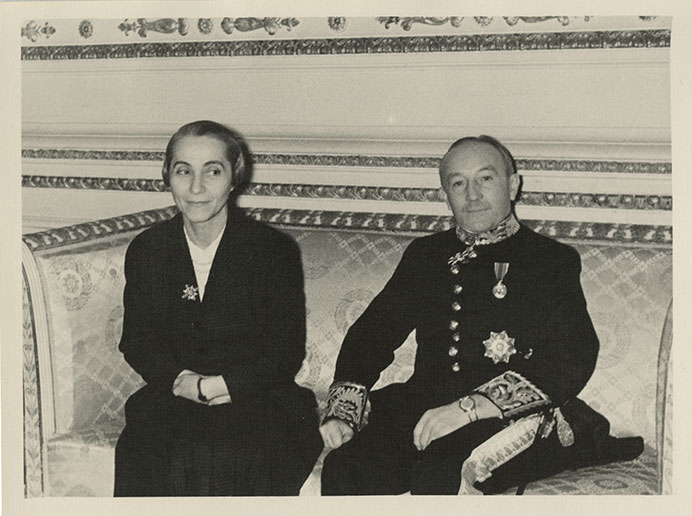
The British diplomat Frank Kenyon Roberts (1907-98) and his US counterpart George F. Kennan were known for their brilliant analyses of Soviet policies while based in Moscow in 1946. However, while Kennan – ‘X’, his pseudonym for a 1947 article about Soviet conduct – has been the subject of a vast literature, Roberts has received far less attention. I am completing the first biography of Roberts, whose career spanned nearly four decades. His personal correspondence (boxes 32, 33 and 34), covering his childhood through to his late twenties, reveals his development during a formative period. Among other things, it is fascinating to see how through his master at Rugby School, John Lockhart, Roberts gained an admiration for Robert Lockhart, John’s brother and who was known for his diplomatic intrigues in Russia during the Revolution, and with whom Roberts would work in the Foreign Office years later. There is evidence of Roberts’ worries, while posted at the Paris Embassy, about Hitler from the early days of the Nazi regime, and there are insights into the negotiations for the Anglo-Egyptian Treaty, which was signed when Roberts was based at the High Commission in Cairo in 1936. Intended to assuage Egyptian nationalism, the treaty proved to be little more than a sticking plaster. In one of many post-retirement interview transcripts (boxes 3 and 4), Roberts explained that after marrying (1937) Celeste Shoucair, who was Lebanese, he avoided Middle Eastern questions, but in a 1973 letter (box 6) he revealed his longstanding sympathy for the Arab position in Palestine. Elsewhere (box 2) in the Roberts collection it is clear that while he and George F. Kennan came to have different ideas about European security matters they always held one another in great esteem. Overall, Roberts’ papers flesh out his personality and fill in many gaps in the records available at the National Archives in Kew.
Other collections were valuable, too. An interview with Thomas Brimelow (GBR/0014/BIMO), a Soviet specialist in the Foreign Office, provides character sketches of Roberts, Kennan and other important figures. The papers of John Hynd MP contain a great deal of material about the ‘German question’, which Roberts dealt with while in Whitehall, 1951-54. Julian Amery MP’s papers hold documents from the same period about European integration and the European Defence Community (EDC) proposal, which was intended to enable West German rearmament. A letter (AMEJ 1/2/90) reveals that a proposal to rearm West Germany within NATO rather than the EDC was in circulation in 1952, so it was not new when Roberts and Anthony Eden implemented it after France rejected the EDC two years later. The papers of Gladwyn Jebb, a Foreign Office contemporary of Roberts, indicated that while these two officials often clashed over policy matters, they did not ‘hate’ one another, as someone has suggested. The relationship was a mutually respectful one that generated light as well as sparks, as Roberts described it. The papers of William Barker, Ernest Bevin, Alexander Cadogan, John Colville, Reginald Drax, Selwyn Lloyd, William Strang, and Robert Vansittart and others also shed light on the long career of Britain’s ‘Mr X’.

Dr Jonathan Colman
Senior Lecturer in International History
University of Central Lancashire, Preston
Subscribe to Churchill Archives Centre News
Enter your email address:
Subscribe to the Churchill Archives News RSS feed:
